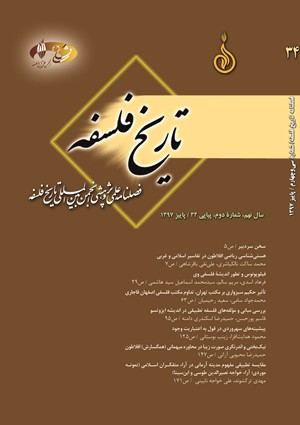نيکبختي و اندرنگري صورتِ زيبا در محاوره ميهماني (همگسارش) افلاطون
محورهای موضوعی : اندیشههای حکمی و فلسفی ایران باستان
1 - دانشگاه تربيت مدرس
کلید واژه: اروس (عشق) اندرنگري صورت امر زيبا افتخار ناميرايي ,
چکیده مقاله :
گفتار/ سخنراني ديوتيما در محاوره ميهماني (همگسارش) افلاطون از جمله مهمترين سخنان وي در آثارش است. نوشتار حاضر، بطور خاص، واپسين عبارات ديوتيما در اين سخنراني را مورد بررسي قرار ميدهد؛ عباراتي که تمرکزشان بر روي رابطه ميان نيکبختي و اندرنگري امر زيبا استوار است. ديوتيما ادعا ميکند که وقتي فيلسوف يا عاشق (در اينجا عاشق سوفيا) به اوج قلة صعود خود رسيده و شروع به اندرنگري صورت زيبا ميکند، تنها در اينجاست که اين اندرنگري صورت زيبا، براي وي فضيلت، نيکبختي و ناميرايي حقيقي را به ارمغان ميآورد. اما چگونه بايد اين ادعا را تفسير کرد؟ هدف نوشتار حاضر نشان دادن اين نکتة تفسيري است که برداشت افلاطون از معناي اندرنگري صورت زيبا را بايد در بستر برنامهيي اخلاقي، سياسي و در ارتباط با زندگي عملي يک شهروند دريافت و نه صرفاً در قالب برداشتي يکسره انتزاعي و نظري. در بخش نخست اين نوشتار، مسئلة مورد نظر با بررسي قسمتهاي گوناگون سخنان ديوتيما تقرير ميگردد و در بخش دوم، با توجه خاص به سخنراني آلکيبيادس نشان داده ميشود که براي فهم برداشت افلاطون از مسئله بايد به زواياي گوناگون اين سخنراني توجهي خاص مبذول داشت و نهايتاً در نتيجهگيري تفسير مؤلف بر اساس خوانشي کلي از محاوره ميهماني و بطور خاص شخصيت آلکيبيادس و سخنان وي، از واپسين عبارات ديوتيما ارائه ميگردد.
Diotima’s speech in Plato’s Symposium is one of the most important parts of his works. The present paper exclusively examines the last of Diotima’s speech, where Plato uses some words and phrases focusing on the relationship between happiness and contemplation of beauty. Diotima claims that, only when a philosopher or lover (here, in love with Sophia) reaches the peak of his love and begins his contemplation of beauty, he could attain knowledge, happiness, and true eternity, but the question is, “How could this claim be interpreted?” The purpose of the author in this paper is to attract the attention of readers to the interpretive point that Plato’s understanding of the meaning of contemplation of beauty should be perceived in the context of an ethical and political program and in relation to the practical life of a citizen rather than within a purely abstract and theoretical inferential framework. The first part of this paper explains the intended problem through an investigation of different sections of Diotima’s speech. In the second part, with particular attention to Alcibiades’ speech, the author demonstrates that, in order to learn about Plato’s understanding of this problem, one must pay particular attention to the various dimensions of this speech. Finally, he concludes the paper by presenting an interpretation of Diotima’s last words based on a general reading of Symposium and, specifically, Alcibiades’ character and words.
پوشنر، مارتين، تئاتر ايدهها، ترجمة مرتضي نوري، نشر شبخيز، 1396.
محبوبي آراني، حميدرضا، «فضيلت و سعادت در انديشه اخلاقي سقراط»، مجله متافيزيک دانشگاه اصفهان، 1391.
Aristotle, The Complete Works of Aristotle: The Revised Oxford Translation, edited by Johnathan Barnes, Princeton University Press, 1984.
Cooksey, Thomas L., Plato’s Symposium, Continuum International Publishing Group, 2010.
Destrée, Pierre, “How Does Contemplation Make You Happy? An Ethical Reading of Diotima’s Speech”, in Plato’s Symposium, A Critical Guide, edited by Pierre Destrée and Zina Giannopoulou, Cambridge University Press, 2017.
Halperin, D. M., One Hundred Years of Homosexuality and Other Essays on Greek Love, Routledge, 1990.
Helfer, Ariel, Socrates and Alcibiades, University of Pennsylvania Press, 2017.
Jaeger, Werner, Paideia, The Ideals of Greek Culture, trans. By Gilbert Highet, Oxford University Press, 1945.
Nussbaum, M., “The Speech of Alcibiades: A Reading of Plato’s Symposium”, Philosophy and Literature 3, 1979.
Nussbaum, M., “The Speech of Alcibiades: A Reading of Plato’s Symposium”, in The Fragility of Goodness (Cambridge), 1986.
Nightingale, A. W., Spectacles of Truth in Classical Greek Philosophy: Theoria in Its Cultural Context, Cambridge University Press, 2004.
The Symposium, edited by M. C. Howatson and Frisbee C. C. Sheffield, translated by M. C. Howatson, Cambridge University Press, 2008.
Plato, Complete Works, edited, with Introduction and Notes, by John M. Cooper, Hackett Publishing, 1997.
Sedly, David, “Divinization”, in Plato’s Symposium, A Critical Guide, edited by Pierre Destrée and Zina Giannopoulou, Cambridge University Press, 2017.
Sheffield, Frisbee C. C., “A Fetish for Fixity?”, in Plato’s Symposium, A Critical Guide, edited by Pierre Destrée and Zina Giannopoulou, Cambridge University Press, 2017.
Sheffield, Frisbee C. C., Plato’s Symposium: The Ethics of Desire, Oxford University Press, 2006.
Walker, Matthew D., Aristotle on the Uses of Contemplation, Cambridge University Press, 2018.


